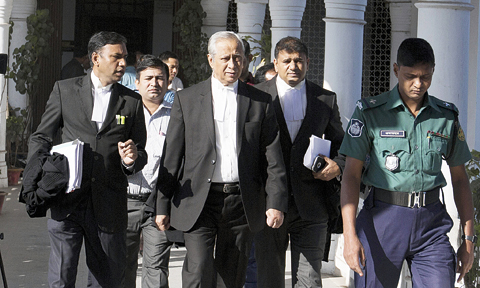 DHAKA: Attorney General of Bangladesh, Mahbubey Alam, center, walks out of the Supreme Court after the hearing of a review petition relating to the death sentence of Harkatul Jihad leader, Mufti Abdul Hannan. —AP
DHAKA: Attorney General of Bangladesh, Mahbubey Alam, center, walks out of the Supreme Court after the hearing of a review petition relating to the death sentence of Harkatul Jihad leader, Mufti Abdul Hannan. —APNEW DELHI: Bangladesh's Supreme Court yesterday upheld death sentences for the leader of a banned Islamic group and two of his associates found guilty in a 2004 grenade attack on a British envoy. Defense lawyers representing Mufti Abdul Hannan, head of the group Harkatul Jihad, said they would appeal for a Supreme Court review of yesterday's ruling, though such reviews are rare.
Hannan and the two others were found guilty in 2008 of orchestrating a grenade attack against Bangladesh-born British High Commissioner Anwar Choudhury while he was visiting a popular Islamic shrine in the northeastern city of Sylhet in 2004. Choudhury was unharmed, but the attack killed three police officers and wounded 70 others.
The trial court in 2008 sentenced two other associates of Hannan to life in prison in connection with the attack. Hannan took over leadership of Harkatul Jihad in the late 1990s. The group, formed in 1992 by Bangladeshis returning from fighting Soviet forces in Afghanistan, has been blamed for many other attacks in the Muslim-majority nation. Hannan was also sentenced to death for another attack in 2001 that killed 10 people during a new year celebration. He remains on trial in a 2004 grenade attack that killed 24 people which targeted Prime Minister Sheikh Hasina when she was the opposition leader. Hasina escaped injury. The group was banned by the government in 2005. - AP










